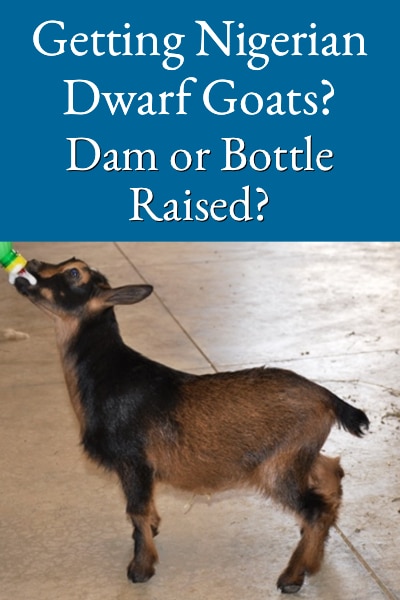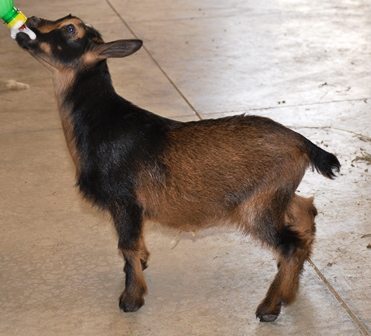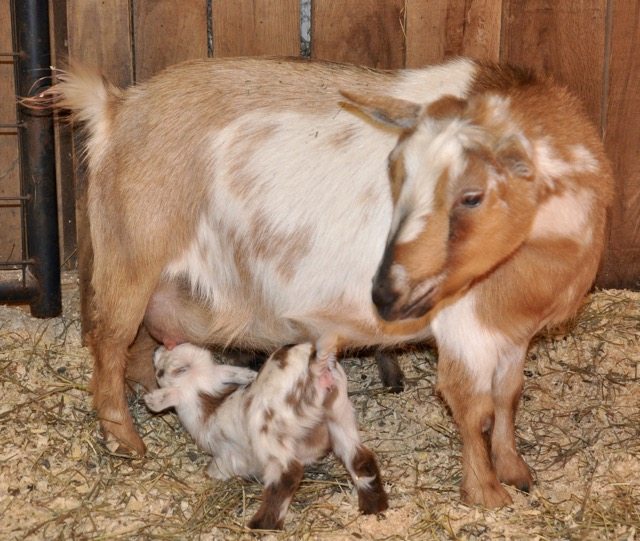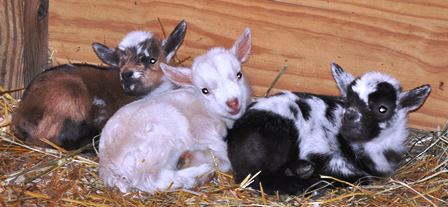If you have decided to purchase some young dairy goats, still another decision to make is whether to purchase kids that have been dam or bottle-
In the goat world, most kids are removed from their dams immediately after birth and bottle raised.
Why Bottle Raised?
The main reason for this is to prevent the transmission of deadly diseases (you can read more about them HERE) from the dams to the kids through the milk. However, these bottle-raised kids (aka bottle babies) still need to drink the colostrum that the dam produces in the first few hours after birth. So the does are milked, the milk is pasteurized, and then it is bottle-fed to the kids.
Kids are also bottle-raised because some breeders feel that bottle raising results in goats that are better socialized and friendlier than dam raised goats. Finally, there are breeders that believe allowing the dam to nurse the kids ruins her udder for show purposes.

Bottle Raised Old Mountain Farm Taylor Quinn
Dam Raised
Nigerian Dwarf goats are relatively new arrivals as a goat breed and disease is less prevalent than among the standard size goats. So, dam raised kids can still be found from Nigerian Dwarf goat breeders.
Dam raised kids are those that are allowed to stay with their dam and nurse whenever they (or their dam) decide it’s appropriate.
Allowing the dam to raise her kids is less time consuming for the goat owner. But, it also means that the owner doesn’t get immediate access to the milk for their own use.

Dam Raised Bramblestone Skittles
Which Is Better?
If there is any chance that a goat could contract one of the five deadly goat diseases from its dam, then obviously it should be separated immediately at birth and bottle raised.
But if the goat herd has been regularly tested and shown to be free of any disease, then bottle raising or dam raising is a personal choice. We test annually and have not had a goat test positive for disease, so we dam raise the kids.
Dam raised kids tend to be the healthiest since it’s hard to improve on Mother Nature’s original plan. However, bottle-raised kids can leave for new homes a few weeks after birth (if the new owners have a supply of goat milk) whereas dam raised kids can’t leave until they are weaned. This usually occurs at around eight to ten weeks.
We own both bottle-raised and dam raised Nigerian Dwarf goats and don’t notice any difference in how well socialized they are. Those that have been bottle-raised seem a bit more demanding (they want that bottle) and less respectful of humans.
When choosing goat kids, make sure to find out how the kids have been raised and protected from disease before deciding which ones to bring home. We’ve found that if they’re friendly and well socialized, both bottle and dam raised dairy goats kids have become fantastic additions to our herd.

Bramblestone Dam Raised Kids (Hot Tea 2013)
Cindy says
Hi Lesa! I Love the information you have on your website. Thank you so much for doing this!
My question is: I want to let me doe dam raise her babies, but I am being told it will ruin her udder. What has your experience been for the dam raised babies that you have?
Thank you for your help!
Cindy says
*my
Sharon says
Want to get my first two Nigerian dwarf goats and I wanted to milk them what do I look for and how much does it cost estimate oh my God
Lesa says
Hi Sharon, That’s a big question! You can find a lot of information about what to get, etc. in the goat archive of this website. The goat archive is here: https://www.betterhensandgardens.com/category/goat-2/ Or, you could download my ebook Nigerian Dwarf Goats 201: Getting Started and find the information in there.
LeAnn Harbert says
I want to get my granddaughters a bottle baby to raise.